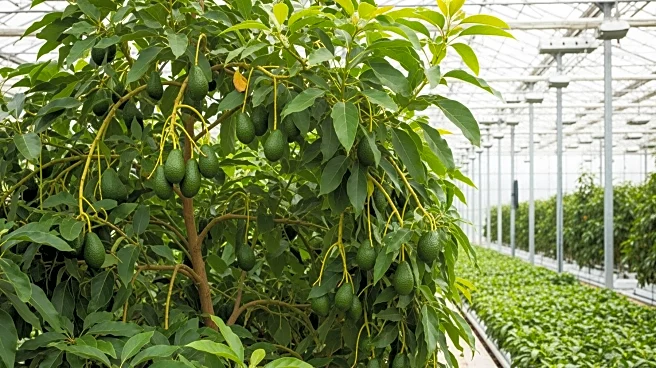What's Happening?
In the Mediterranean region, particularly in Malaga's Axarquia, greenhouse cultivation of avocados is emerging as a promising agricultural practice. This development follows successful experiments with greenhouse mangoes, which demonstrated the viability
of growing tropical fruit trees in controlled environments. The Lamb Hass avocado, a compact variant of the traditional Hass, is particularly suited for greenhouse cultivation due to its manageable size. This method allows for earlier harvesting, protection from environmental elements, and improved fruit quality through controlled pollination. The practice is gaining traction among growers seeking less labor-intensive and more profitable alternatives to traditional horticulture.
Why It's Important?
The shift to greenhouse avocado farming represents a significant innovation in agriculture, offering potential economic benefits to growers in regions previously unsuitable for such crops due to climate constraints. By enabling cultivation in diverse climates, this method could increase avocado production, meeting rising global demand. The economic implications are substantial, with growers achieving high yields and favorable market prices. This approach also highlights the adaptability of agricultural practices to changing environmental conditions, potentially influencing future farming strategies and food security.
What's Next?
As greenhouse avocado farming expands, growers may continue to refine techniques to optimize yield and quality. The success of this method could encourage further investment in greenhouse infrastructure and technology, potentially leading to broader adoption across other regions. Stakeholders, including agricultural businesses and policymakers, may explore supportive measures to facilitate this transition, such as funding for greenhouse construction and research into sustainable practices.
Beyond the Headlines
The adoption of greenhouse farming for avocados raises questions about resource management, particularly water usage and quality, which are critical for successful cultivation. This practice may also influence land use patterns, as areas previously unsuitable for avocado farming become viable. Additionally, the environmental impact of increased greenhouse construction and operation warrants consideration, balancing economic gains with ecological sustainability.

















